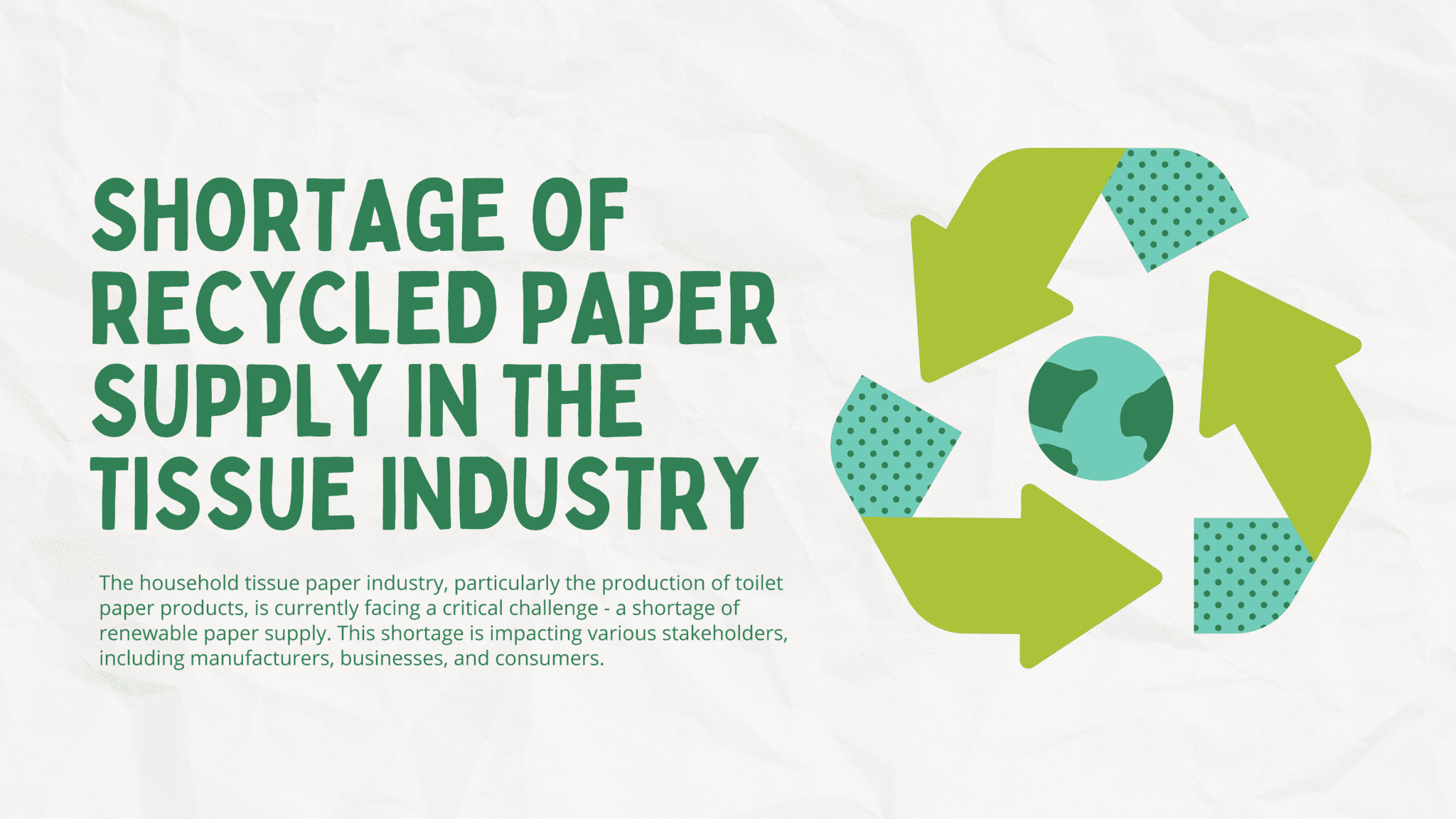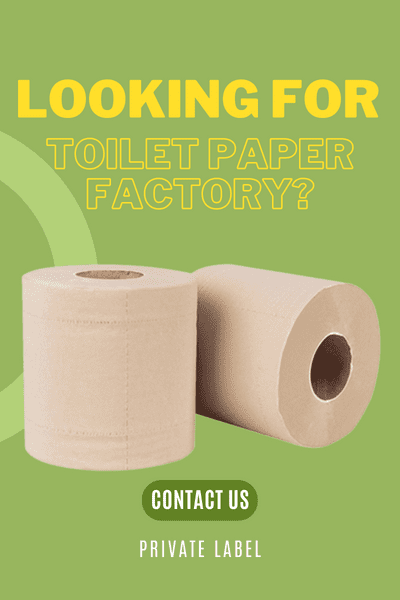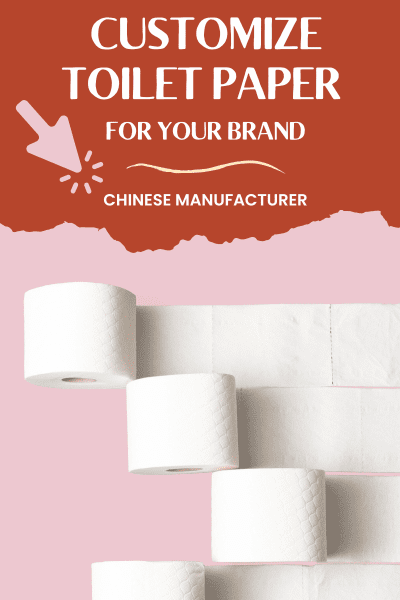Why is bamboo toilet paper becoming a sustainable alternative to recycled paper?
Due to a global shortage of recycled paper and increasing demand for eco-friendly products, bamboo toilet paper has emerged as a sustainable and reliable alternative. It offers strong environmental benefits, fast renewability, and consumer appeal, making it ideal for brands seeking long-term eco solutions.
The household tissue paper industry, particularly the production of toilet paper products, is currently facing a critical challenge – a shortage of recycled paper supplies. This shortage is impacting various stakeholders, including manufacturers, businesses, and consumers.
The recycled paper supply scarcity began with the overreliance on virgin pulp in the toilet paper industry. Virgin pulp of softwood fiber and hardwood fiber is the preferred material in the production process due to its softness and absorbency. However, these trees take 15-30 years to reach maturity, making it a significantly long wait time for the material to be available for the industry to use. This high demand for virgin pulp has resulted in deforestation, habitat loss, and other negative ecological consequences.
One solution that emerged to combat the shortage of virgin pulp was through high-quality recycled fibers. Recycled fibers serve as an excellent alternative since it answers the pressing need to have more eco-friendly options while addressing the ongoing shortage of virgin pulp. The recycled fibers are made from repurposing raw materials such as cardboard boxes, newspapers, and other paper items that would otherwise head to landfills.
Another important reason for the popularity of recycled pulp toilet paper in the market is its high cost-effectiveness.
But due to various factors, there are fewer and fewer recyclable fibers on the market. The tissue industry today faces a critical shortage of recycled pulp.
What is causing the recycled paper supply shortage?
The scarcity of recycled paper within the tissue industry can be ascribed to a multitude of factors.
The most prominent reason is the global shift towards digitalization. With the widespread adoption of digital devices and technologies, the demand for paper products has dwindled significantly. As a result, there are fewer paper materials available for recycling, which has led to a shortage of recycled pulp.
Another contributing factor is the inefficient recycling system in many countries. Often, paper products are not collected and recycled properly, leading to a lower supply of recyclable fibers. In some areas, a lack of adequate infrastructure and investment may hinder the ability to meet the growing demand for recycled paper.
Furthermore, With the growing awareness of the need to reduce carbon footprints and promote eco-friendly practices, companies have been seeking to use recycled paper for various purposes, leading to increased demand.
The ramifications of the recycled paper shortage on the paper towel manufacturing industry have been extensively documented over time.

How it is affecting the household tissue paper industry?
Recycled toilet paper by the big companies is decreasing. Ethical Consumer magazine in the current year has unveiled compelling findings. The investigation reveals that leading toilet paper manufacturers, namely Kimberly-Clark, Essity, and Sofidel, are considerably reducing the incorporation of recycled pulp in their tissues.
It found that in 2011 Kimberly-Clark used 29.7% recycled fiber but in 2021 it used only 19.3%. Essity (which makes Velvet and Cushelle) used 40% recycled fiber in 2018 but by 2022 this dropped to 36%, while in 2019 Sofidel (maker of Regina and Nicky) used 8.9% recycled material but in 2021 it used only 7.3%.
With the ongoing concern over environmental issues, the industry is facing a dilemma on how to balance meeting consumers’ needs for recycled tissue products with the responsibility to minimize their carbon footprint.
Shanta Bhavnani, a researcher at Ethical Consumer, said: “There’s so much awareness now of the importance of trees in addressing climate change so it’s really disappointing to see the big toilet paper companies cutting their use of recycled fibers.” “But it’s encouraging to see the growth in the number of alternative toilet paper products, as it means consumers now have many more sustainable options.”
It recommended that people buy toilet rolls conscious made from recycled paper or sustainably sourced bamboo pulp with no plastic packaging.
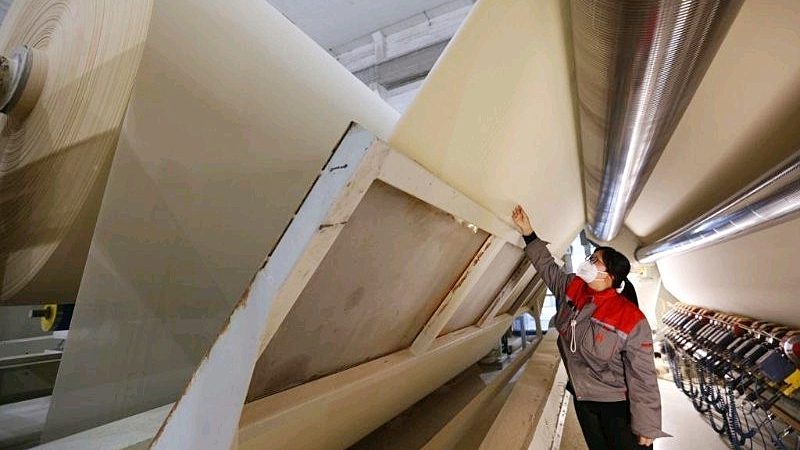
What companies and consumers are doing to combat the shortage?
As concerns about environmental sustainability continue to grow and the growing demand, the supply of recycled paper has struggled to keep pace. This scarcity has prompted consumers and businesses alike to seek out alternative solutions that have a lower impact on the environment.
This shift in consumer preferences is evident in the rise of eco-friendly alternatives like bamboo toilet paper. Many environmentally conscious companies have recognized this trend and are taking proactive measures to offer sustainable options to their customers.
This is the display result of bamboo toilet paper and recycled toilet paper on Google Trends. It is evident that the bamboo pulp toilet paper trend is consistently surpassing that of recycled paper and gradually moving towards a state of stabilization.
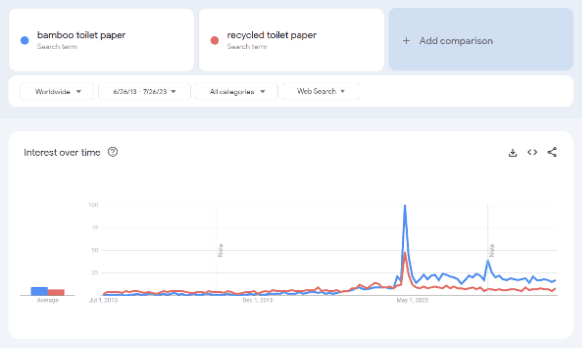
How can we assist enterprises in dealing with the recycled paper shortage trends?
Newland Bamboo, a professional bamboo household tissue paper manufacturer, offers a unique and customizable approach with its bamboo toilet paper to combat the shortage of recycled paper.
Our bamboo toilet paper, bamboo facial tissue, bamboo kitchen paper, and bamboo napkins are not only environmentally conscious but also offer superior softness and durability compared to recycled pulp options.
By choosing to incorporate bamboo tissue into your tissue business, your brand can lead the way in promoting sustainable practices and responsible sourcing. Not only will this decision help address the shortage of recycled paper, but it will also resonate with environmentally conscious consumers who prioritize products with a lower ecological footprint.
As a responsible tissue supplier, providing bamboo tissue will not only contribute positively to the environment but also demonstrate your commitment to meeting the evolving demands of consumers for more sustainable and eco-friendly paper products.
Are you a brand looking to adopt sustainable practices? Discover our innovative bamboo-based paper products and let us assist you in making the shift. Contact us today to learn more and benefit from the expertise of our dedicated team.
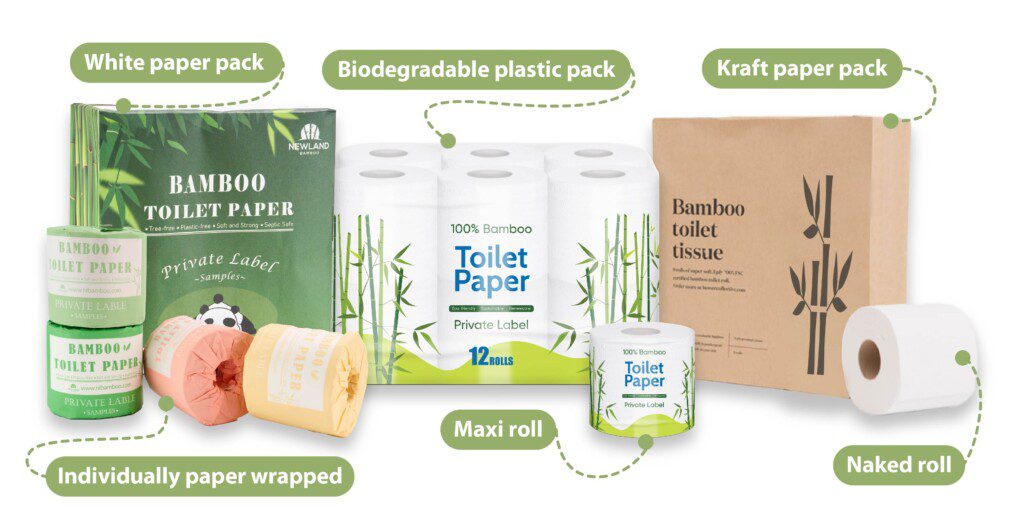
In conclusion, the shortage of recycled toilet paper and the growing concern for environmental preservation have paved the way for the emergence of bamboo toilet paper as a sustainable alternative. Embracing this eco-friendly option will not only help tackle the scarcity of recycled paper but also empower consumers to make greener choices.
Let us unite in this endeavor, encouraging suppliers to prioritize eco-friendly bamboo toilet paper and collectively safeguard the future of our planet.
FQA:
1. Why is there a shortage of recycled toilet paper?
The shortage is driven by reduced paper consumption due to digitalization, inefficient recycling systems, and increased global demand for eco-friendly paper products.
2. Is bamboo toilet paper better than recycled paper?
Yes. Bamboo toilet paper is more renewable, softer, and often has a lower environmental footprint. It grows much faster than trees and doesn’t rely on recycled waste streams.
3. Can bamboo tissue be used for OEM or private label brands?
Absolutely. Newland Bamboo offers OEM and private label services for bamboo toilet paper, kitchen rolls, facial tissues, and napkins tailored to your brand’s needs.
4. Does bamboo tissue come with certifications?
Yes. Our bamboo tissue products can be certified with FSC and other eco-labels depending on your market’s requirement.
5. How fast can I receive samples or place a bulk order?
We offer free samples with 7-day shipping, and bulk orders are ready for international dispatch within 15-30 days depending on your customization needs.

